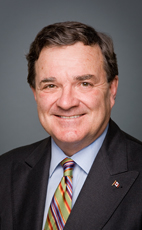Mr. Speaker, the Prime Minister said that we are continuing our discussions with the Quebec finance minister on true harmonization.
 House of Commons photo
House of Commons photoWon his last election, in 2011, with 58% of the vote.
Post-secondary Education March 23rd, 2010
Mr. Speaker, the Prime Minister said that we are continuing our discussions with the Quebec finance minister on true harmonization.
Ways and Means March 22nd, 2010
Mr. Speaker, pursuant to Standing Order 83(1) I wish to table a notice of ways and means motion to implement certain provisions of the budget tabled on March 4, 2010, and other measures.
I ask that an order of the day be designated for the consideration of the motion.
Financial Markets March 22nd, 2010
Mr. Speaker, we do support our financial institutions. They are well regulated and well managed, including the Bloc leader's favourite financial institution through which he invests, Groupe Desjardins, and including the Banque Nationale du Canada in Montreal.
We are fortunate in Canada to have a well regulated, well managed financial system. We are, in fact, the envy of most western developing countries in this regard. No, we will not impose a capital tax on our banks and no, we will not impose a Tobin tax because we do not need to. We have success in our financial sector.
Taxation March 22nd, 2010
Mr. Speaker, the member for Markham—Unionville can tell the House his plan that it is certainly a mathematical possibility to raise taxes. That is the view of the Liberal opposition in this place.
In the United States and in the United Kingdom, where I was last week, I had the opportunity to listen to what financial experts and fiscally responsible people thought of Canada. Our brand is superb. We have it right with respect to financial regulation, the strength of our financial institutions and the fiscal responsibility of the government moving back to a balanced budget.
Taxation March 22nd, 2010
Mr. Speaker, we are delivering historical and permanent tax relief in Canada. Total savings for a typical family in Canada is now over $3,000 as a result of four years of Conservative government.
We have reduced the GST from 7% to 5%. On this side of the House, unlike the official opposition, we do not intend to raise the GST.
We are also continuing with our business tax cuts, where we will have most of the provinces at 10% by 2013 or so. The federal government is 15%, a combined tax rate for businesses in Canada, which is a great brand internationally of—
The Budget March 11th, 2010
Mr. Speaker, we have Canada's economic action plan. The Liberals have Canada's economic inaction plan. We are lowering taxes for Canadians. The Liberals want to raise taxes. We are protecting health and social transfers to the provinces. The Liberals were slashing those to the bone in the 1990s. While our plan will protect and create 220,000 jobs, the Liberal plan would kill jobs in Canada. How many jobs would the Liberal plan kill? Informetrica says 162,000 Canadian jobs would be lost with a 2% Liberal rise in the GST.
Taxation March 11th, 2010
Mr. Speaker, it is too bad that the member does not agree with the opinions of the best economists in Quebec: economists from Desjardins Group, from the National Bank of Canada in Montreal, and from the Laurentian Bank, also in Montreal.
The best economists in Canada have offered their views, all 15 of them, and that is what we accepted. It is on page 33 of the budget. The hon. member is welcome to read the names, and so is Mr. Page.
Taxation March 11th, 2010
Mr. Speaker, I thank the member for his question.
The Parliamentary Budget Officer was wrong before and he is wrong again. The Parliamentary Budget Officer is saying that the private economic outlook is not a prudent basis for fiscal planning. He is refusing to use projections from the strongest financial sector in the world that has weathered the recession better than any other country. He is saying that is not a prudent basis for economic planning.
If he does not accept it, he can talk to the economists at TD Bank, BMO, CIBC, RBC, Scotiabank, Bank of America, Merrill Lynch, the Conference Board of Canada, Desjardins, the Caisse de dépôt—
The Budget March 10th, 2010
Mr. Speaker, I would be happy to do that. The economists have been very complimentary of the budget, as a matter of fact. I met with them in February. We used their forecasts in the budget, as set out on page 33.
The Conference Board and TD economists welcomed it as a credible plan. Desjardins economists called it a clear and well-grounded plan. At BMO, UBS Securities, and Merrill Lynch, in fact, their economists felt perhaps it was too prudent in its revenue assumptions.
What did RBC economist Patricia Croft say? She said, “Canada, on a relative basis, coming out of this crisis, I think is a winner.... a gold medal performance on the fiscal side”.
Taxation March 10th, 2010
Mr. Speaker, I gather that what the member opposite wants is for the government to tell the Desjardins group, the caisses populaires movement, and the National Bank of Canada, headquartered in Montreal, how they should run their businesses, to confiscate their profits and to take money away from their shareholders.
That is not our structure in this country. We are proud of our financial institutions. They are performing well in a difficult economic climate.